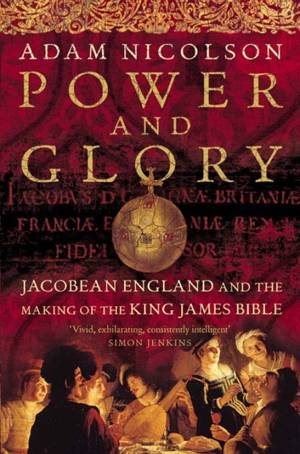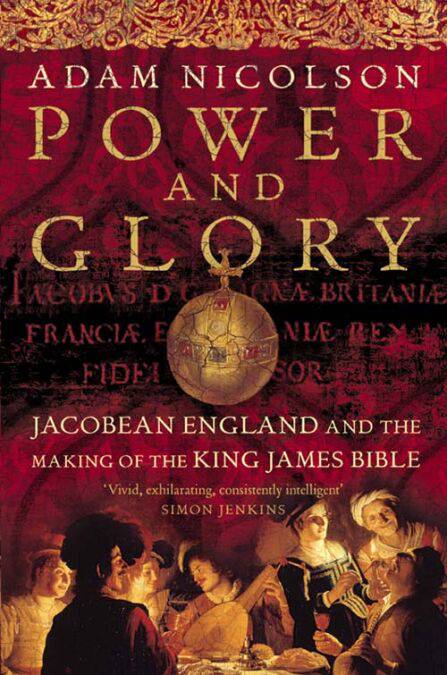
Bedankt voor het vertrouwen het afgelopen jaar! Om jou te bedanken bieden we GRATIS verzending (in België) aan op alles gedurende de hele maand januari.
- Afhalen na 1 uur in een winkel met voorraad
- In januari gratis thuislevering in België
- Ruim aanbod met 7 miljoen producten
Bedankt voor het vertrouwen het afgelopen jaar! Om jou te bedanken bieden we GRATIS verzending (in België) aan op alles gedurende de hele maand januari.
- Afhalen na 1 uur in een winkel met voorraad
- In januari gratis thuislevering in België
- Ruim aanbod met 7 miljoen producten
Zoeken
Power and Glory E-BOOK
Jacobean England and the Making of the King James Bible (Text only)
Adam Nicolson
E-book | Engels
€ 7,79
+ 7 punten
Omschrijving
A fascinating, lively account of the making of the King James Bible.
James VI of Scotland – now James I of England – came into his new kingdom in 1603. Trained almost from birth to manage rival political factions, he was determined not only to hold his throne, but to avoid the strife caused by religious groups that was bedevilling most European countries. He would hold his God-appointed position and unify his kingdom. Out of these circumstances, and involving the very people who were engaged in the bitterest controversies, a book of extraordinary grace and lasting literary appeal was created: the King James Bible.
47 scholars from Cambridge, Oxford and London translated the Bible, drawing from many previous versions, and created what many believe to be the greatest prose work ever written in English – the product of a culture in a peculiarly conflicted era. This was the England of Shakespeare, Marlowe, Jonson and Bacon; but also of extremist Puritans, the Gunpowder plot, the Plague, of slum dwellings and crushing religious confines. Quite how this astonishing translation emerges is the central question of this book.
Far more than Shakespeare, this Bible helped to create and shape the language. It is the origin of many of our most familiar phrases, and the foundations of the English-speaking world. It was a generous and deliberate decision to make the Bible available to the common man: not an immediate commercial success, but which later became a bestseller, and has remained one ever since.
Adam Nicolson gives a fascinating and dramatic account of the early years of the first Stewart ruler, and the scholars who laboured for seven years to create the world's greatest book; immersing us in a world of ingratiating bishops, a fascinating monarch and London at a time unlike any other.
James VI of Scotland – now James I of England – came into his new kingdom in 1603. Trained almost from birth to manage rival political factions, he was determined not only to hold his throne, but to avoid the strife caused by religious groups that was bedevilling most European countries. He would hold his God-appointed position and unify his kingdom. Out of these circumstances, and involving the very people who were engaged in the bitterest controversies, a book of extraordinary grace and lasting literary appeal was created: the King James Bible.
47 scholars from Cambridge, Oxford and London translated the Bible, drawing from many previous versions, and created what many believe to be the greatest prose work ever written in English – the product of a culture in a peculiarly conflicted era. This was the England of Shakespeare, Marlowe, Jonson and Bacon; but also of extremist Puritans, the Gunpowder plot, the Plague, of slum dwellings and crushing religious confines. Quite how this astonishing translation emerges is the central question of this book.
Far more than Shakespeare, this Bible helped to create and shape the language. It is the origin of many of our most familiar phrases, and the foundations of the English-speaking world. It was a generous and deliberate decision to make the Bible available to the common man: not an immediate commercial success, but which later became a bestseller, and has remained one ever since.
Adam Nicolson gives a fascinating and dramatic account of the early years of the first Stewart ruler, and the scholars who laboured for seven years to create the world's greatest book; immersing us in a world of ingratiating bishops, a fascinating monarch and London at a time unlike any other.
Specificaties
Betrokkenen
- Auteur(s):
- Uitgeverij:
Inhoud
- Aantal bladzijden:
- 288
- Taal:
- Engels
Eigenschappen
- Productcode (EAN):
- 9780007380701
- Verschijningsdatum:
- 25/01/2017
- Uitvoering:
- E-book
- Beveiligd met:
- Adobe DRM
- Formaat:
- ePub

Alleen bij Standaard Boekhandel
+ 7 punten op je klantenkaart van Standaard Boekhandel
Beoordelingen
We publiceren alleen reviews die voldoen aan de voorwaarden voor reviews. Bekijk onze voorwaarden voor reviews.









